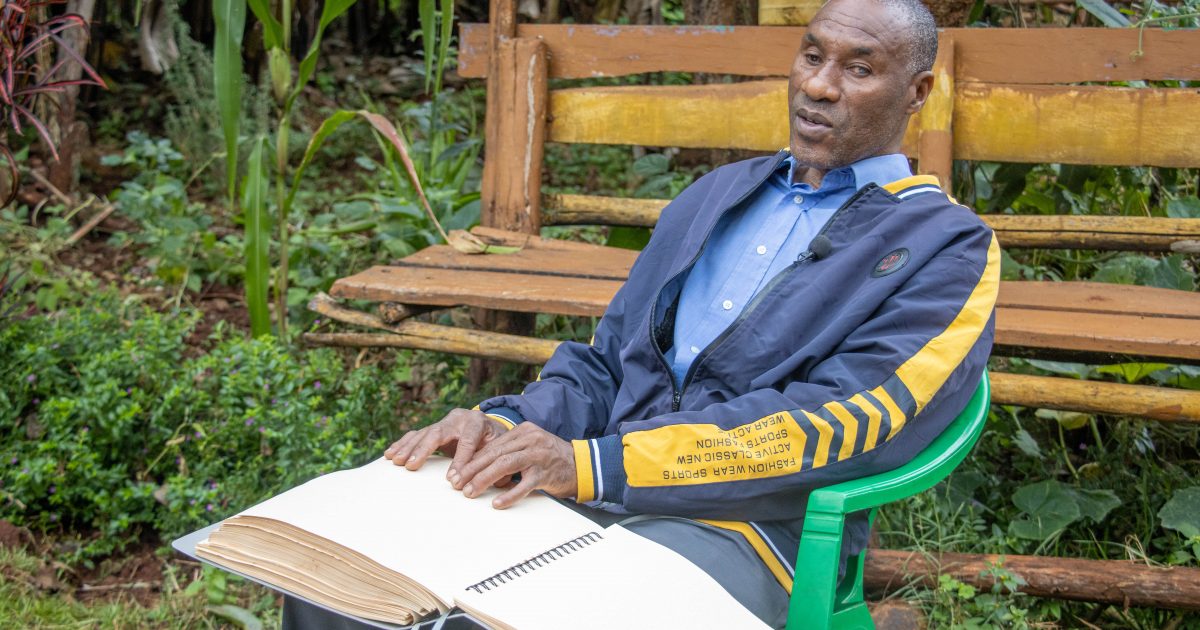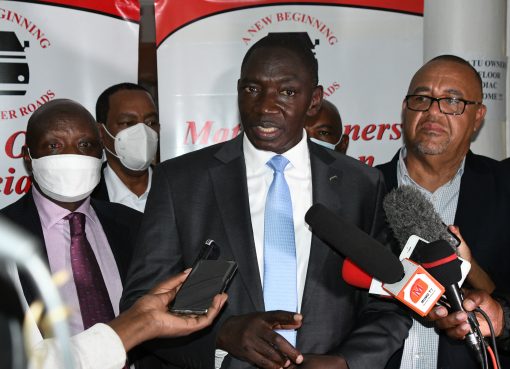More than 1100 delegates are attentively seated in a twin tent. Hard or soft outline in hand, speaker after speaker takes to the rostrum to talk about a subject. Keeping time is critical. No speaker ought to go overtime.
The afternoon comes. One of the speakers is guided to the platform. His outline in hard copy is harder than other speakers’ preceding him. Those after him won’t have a similar one either. This speaker doesn’t see. His name is Gilbert Kamande, a teacher at Gakoigo Primary School in Maragua.
Where he works, he would be teaching Social Studies, Kiswahili or Christian Religious Education (C.R.E). But on this day, August 18, 2023, the subject is a Biblical theme to be developed in the Kikuyu language.
This is the first day of a three-day “Exercise Patience”! Convention of Jehovah’s Witnesses (“Onanagia Wetereri”! Kigomano kía Aira a Jehova kía 2023). The venue is Havila Resort in Sagana.
Kamande’s outline is in Braille, which constitutes a combination of six raised dots. He has to read to the audience at least one scripture. He reads two.
“Since my Bible is very large, I couldn’t carry it,” he explains. “My son Jolys read to me the scriptures. I wrote them in Braille in my outline and read them to the audience from the platform.”
Kamande’s is not a conventional Bible. His New World Translation of the Holy Scriptures, which is in grade two Braille, is made up of 24 volumes, each roughly the size of an encylopaedia. This is because Braille is bulky.
Just as the sighted treasure their eyes, so does Kamande treasure his fingers. With the tips of his fingers, he scans his outline for his talking points as he speaks to the audience paying rapt attention. Even though he can’t see the reaction of those in the gathering, he maintains audience contact.
He uses his right hand to trail the dots progressing to the right of the page. His left one keeps tracing the next lower line of text. He completes his part within the allotted time. The audience spontaneously applauds as he’s guided from the platform.
Kamande rejoins his wife Beth Wangui, daughter Irene Waithira, 21, and son Jolys Githuku, 17, for the rest of the programme. When he was rehearsing his part, Githuku helped him with the timing.
“My father has never seen me,” Githuku says. “I sometimes forget that he is blind due to how hard-working he is.”
Printed programmes are available in leaflet form for the delegates and so are soft copy ones in tablet or Smartphone. Kamande’s is in Braille. It is the bulkiest in this entire gathering. He doesn’t mind.
Before arriving at this beautiful venue, he had used his Braille programme to whet his appetite for what was to come. The three days have come and he’s not in darkness as to what will follow what.
Each day has a scriptural theme. The time that every day’s programme will begin and end is indicated. The songs to be sung are embedded in it. The images in the programme have a description to enable Kamande visualize what is included.
“We ensured that we read all the scriptures that are in the programme so that when we come here, we are able to benefit from the program,” he says.
Kamande’s listening ability has been further sharpened. His wife Wangui says, “Many are the times that he pays more attention and understands more than we do.”
One of the limitations that he has is that some video scenes have silent action. He needs help here. “I receive an explanation from those next to me what is happening,” he discloses.
The Kamande family had been looking forward with eager anticipation to this Convention. It is the first to be held in person since the COVID-19 pandemic sprung.
The Spokesman of Jehovah’s Witnesses in Kenya Noah Munyao says, “A total of 35 conventions were planned to be held in different locations; Nairobi, Mombasa, Kisumu, Nakuru, Machakos, Sagana and Embu.” He adds, “They would be in Swahili, Kikamba, Kikuyu, Luo, English, and the Kenyan Sign Language.”
By the time the 2023 “Exercise Patience” convention series concludes, some 6,000 conventions will have been held around the world.
“It was a great privilege to be assigned a part just like other sighted individuals,” Kamande says. “It warms my heart that people like us have not been ignored.”
The talk that Kamande has just delivered demands careful preparation. It calls for research from diversified sources of information. Thankfully, it’s not only the Bible that he has in Braille.
Kamande has reserved several shelves in his study room for his embossed Bible. Placed one volume atop another, his Bible would reach a height of about seven feet.
He began receiving segments of these scriptures in 2021. He recalls, “Two or three volumes would be dispatched to me from the Branch Office of Jehovah’s Witnesses in Nairobi, at intervals of about three months, until all the volumes had been delivered.”
His Bible covers the 66 books from Genesis to Revelation. “I enjoy reading my Bible very early in the morning when it’s quiet,” he says. “Whether there’s a power blackout or not, it doesn’t matter.”
Kamande is familiar with the set-up of his study room. He knows how to retrieve the desired volume. After a study session, he returns it to its rightful spot.
Prior to receiving his Braille Bible, he would listen to audio recordings. The alternative was someone to read to him portions from the regular size Bible.
“I also receive other Bible study literature in Braille,” he says. “These are dropped, at our Kingdom Hall in Maragua.”
Kamande wasn’t born blind. His eyesight began dimming at the age 12. This prompted his parents to take him to Thika Primary and Secondary schools for the blind. These are the schools that taught him grades one and two of Braille.
Learning Braille requires commitment. It calls for the exercising of patience too. Kamande cultivated these qualities. As a result, he understood contractions and now there’s no English word that he can’t read or write in Braille.
He’s convinced that the three days he’s spent with his family at this convention will aid him to further exercise patience in other aspects of his life.
By William Inganga




